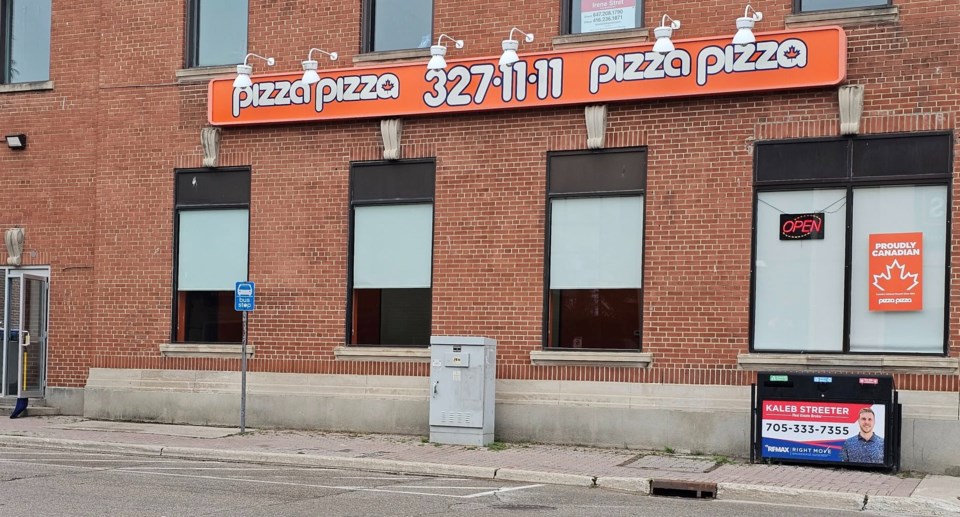ORILLIA — Local outreach groups say the City of Orillia is sending a “stigmatizing” message to people experiencing homelessness and those trying to help them, following the abrupt removal of a public bench downtown and the ticketing of service vehicles providing daily essential supports.
Both The Lighthouse and the Biminaawzogin Regional Aboriginal Women’s Circle (BRAWC) say their outreach vans were ticketed during scheduled service hours in a municipal lot on Colborne Street last week.
Days later, a city bylaw crew removed a bench from the same location, which has served as a consistent, centralized site for community outreach for more than two years.
The incidents prompted formal letters of concern to Mayor Don McIsaac and city councillors, urging immediate dialogue and raising questions about transparency, intent, and the city’s broader commitment to vulnerable residents.
“We are quite shocked by this,” said Linda Goodall, executive director of The Lighthouse. “We were not given any warning, there was no conversation, no indication that this was going to happen. And then to hear that the reason for removing the bench was that it was ‘attracting homeless people’? That’s deeply concerning.”
Goodall said The Lighthouse’s outreach team has been stationed at the Colborne Street parking lot, across from Tim Hortons, every day from 1 to 2 p.m., offering vital resources such as food, water, harm reduction supplies, housing referrals, and supportive conversation. They also operate a breakfast program on Saturdays, while BRAWC provides Indigenous-focused outreach each Wednesday, and the Salvation Army serves more than 100 people at the same location every Friday evening.
On June 18, two vehicles — one from Lighthouse’s youth team and another from BRAWC — were ticketed by bylaw officers. Though the fines were later waived under a general exemption policy, Goodall said it was “not in recognition of the vehicles’ outreach function,” but rather a gesture unrelated to their role in serving vulnerable populations.
Then, on June 25, during regular service hours, bylaw officers returned — this time to remove a public bench at the site. Outreach workers present were told the decision was made because the location was “attracting homeless people.”
“Whether intentional or not, that statement stigmatizes people simply for existing in public spaces,” Goodall said. “It tells them they’re not welcome. That they are the problem. And that’s the opposite of what any compassionate, functional response to homelessness should be built on.”
In a formal letter to the mayor dated June 26, The Lighthouse called the recent actions “deeply distressing” and noted they run counter to the principles outlined in Orillia’s own 2024 Policy Directions Report — a document that outlines inclusion, reconciliation, and support for vulnerable communities as municipal priorities.
“These are not just acts of service. They are lifelines,” Goodall wrote. “Unfortunately, these incidents have created understandable frustration and distress among outreach staff and participants.”
While Goodall said she is still waiting on an official response to her letter, she has requested a conversation with the mayor to help clarify expectations and move forward collaboratively.
“That’s what I do as executive director,” she said. “I have conversations. I don’t want this to be an argument. But we can’t have decisions being made that directly impact people in crisis without dialogue or warning.”
McIsaac acknowledged that complaints had been received from parking lot users and employees at nearby businesses about loitering, littering, and smoking. He said some users reported feeling unsafe in the area, prompting city staff to remove the benches from that specific location.
“My understanding is that the benches were removed from that spot, not from all of downtown,” McIsaac said. “Staff are working with the various entities to try and figure out an alternate place."
McIsaac says, from his understanding, outreach efforts have been happening in the Colborne Street parking lot without permission. He says efforts should be coordinated going forward, and noted the city would aim to identify other locations for benches or service delivery.
Ward 4 Councillor Janet-Lynne Durnford said she was “shocked” to learn about the bench removal and ticketing from community partners, not staff, and confirmed that council was not informed of the decision in advance.
“I don’t know technically whether it’s something council had to be made aware of, but we absolutely should have been,” said Durnford, noting that the city has both an Addiction and Overdose Crisis Working Group and a Poverty Reduction Working Group.
“These are council priorities — helping our most vulnerable — and our relationship with agencies doing that work should reflect that.”
Durnford criticized the approach taken by the city, saying it appeared to contradict Orillia’s stated priorities around compassion and equity.
“If there is a concern about agencies using a municipal parking lot without a formal agreement, then have a discussion," she said. "Don’t start penalizing them and removing benches without warning. It feels reactionary and counterproductive.”
She also says ticketing outreach vehicles should not be a matter of law enforcement.
“If someone is parked in a public lot to serve people who are in crisis, I don’t think the right response is to issue tickets,” she said. “If anything, we should be supporting those efforts with flexibility and clarity.”
Goodall echoed that sentiment, warning that if ticketing becomes routine, it could force The Lighthouse to reevaluate consistent outreach at the downtown site.
“Right now, we’ve told our team to keep showing up," she said. "These services are essential. But if the pressure continues or enforcement ramps up, we may have to reassess,” she said.
While outreach organizations continue to show up for Orillia’s most marginalized, Goodall said she’s hopeful city leadership will do the same, not through enforcement or bench removals, but through honest communication and a shared sense of responsibility.
“There are more people than ever experiencing homelessness in our city,” she said. “This is not a time to withdraw or push people away. This is a time to lean in.”
